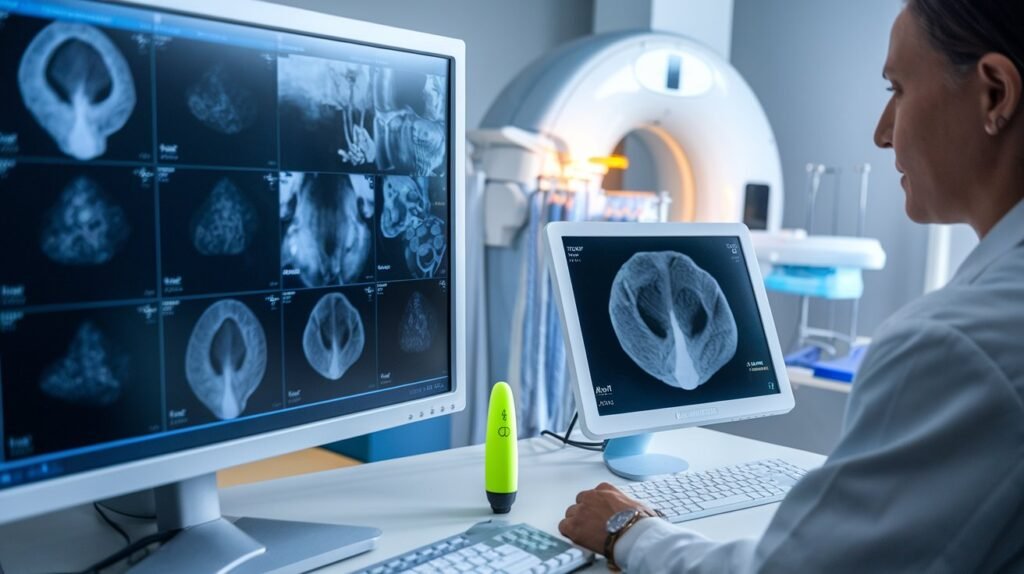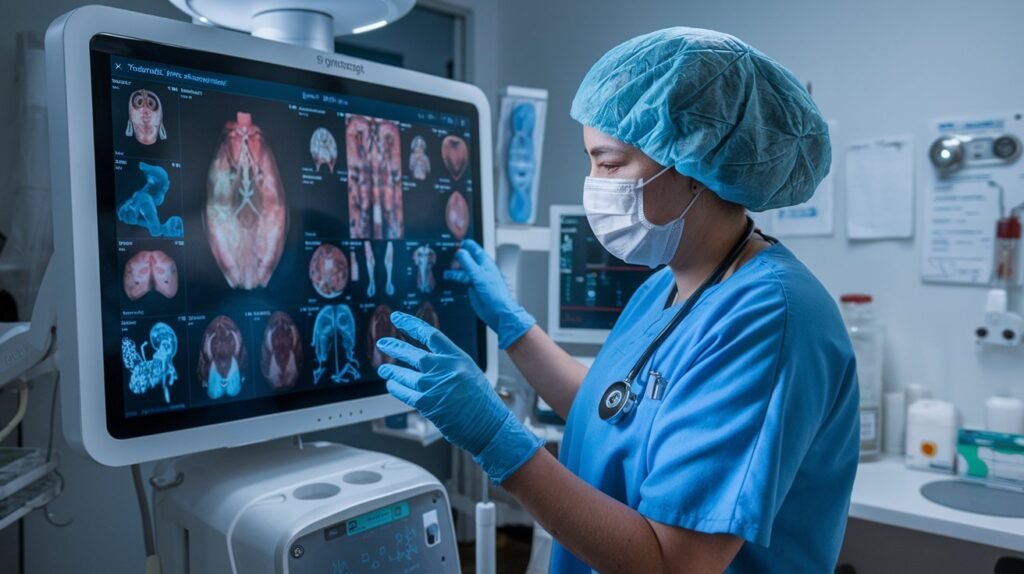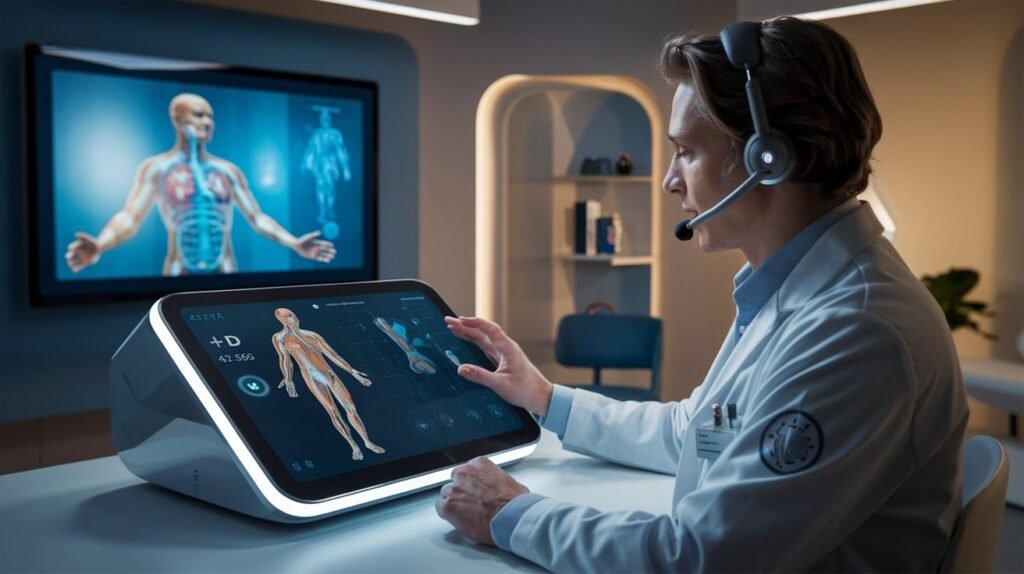In recent years, artificial intelligence (AI) has become a critical tool in healthcare, particularly in medical imaging. Whether it’s detecting tumors, analyzing CT or MRI scans, or aiding in diagnostics, artificial intelligence is revolutionizing the way medical professionals interact with technology to diagnose and treat patients. One of the latest breakthroughs in this field is ScribblePrompt, an interactive AI framework designed to simplify the annotation of medical images, improving both accuracy and efficiency.
This article explores the transformative power of ScribblePrompt and AI in medical imaging, how it works, its applications, challenges, and what the future holds for AI in healthcare.
Why AI in Medical Imaging is a Game-Changer
Medical imaging is one of the most data-intensive areas of healthcare. Every day, radiologists and medical professionals analyze thousands of images, and even the most experienced doctors can sometimes miss subtle details due to time constraints or human error. That’s where AI steps in.
AI systems can analyze medical images more quickly, accurately, and consistently than the human eye. They are trained on massive datasets of scans, allowing them to learn patterns that doctors might overlook. Tools like ScribblePrompt further refine the workflow, reducing the time spent on mundane tasks and freeing up doctors to focus on patient care.

What is ScribblePrompt?
ScribblePrompt is an AI tool designed to assist doctors in annotating medical images with minimal effort. The process of annotating, or marking areas of interest on a scan, is crucial in many medical fields—especially in oncology, cardiology, and neurology—where accurate image labeling can directly influence treatment plans.
However, traditional annotation is time-consuming and requires a high level of expertise. ScribblePrompt simplifies this process by allowing medical professionals to make rough “scribbles” over areas of interest, which the AI then enhances, creating precise annotations of key anatomical structures or abnormalities.
How It Works:
- Image Input: The medical scan (e.g., MRI, CT) is uploaded.
- User Scribbles: The doctor or technician scribbles over areas of interest.
- AI Enhancement: ScribblePrompt uses deep learning to refine these scribbles, creating accurate, detailed annotations of the regions.
- Final Output: The annotated image is ready for review and interpretation by the medical professional.
This process significantly reduces the time needed to review scans, allowing for faster diagnosis and treatment planning.
Advertisement
Benefits of AI and ScribblePrompt in Medical Imaging
Improved Diagnostic Accuracy
AI-driven tools like ScribblePrompt excel in pattern recognition, often identifying details that might be missed during manual review. In many cases, early detection can mean the difference between a successful treatment and a delayed diagnosis. AI systems are also continually learning and improving, making them more accurate over time.
Time Efficiency
Annotating medical images manually is a time-intensive process. With ScribblePrompt, medical professionals can mark areas of interest in seconds, leaving the heavy lifting to the AI. This efficiency is especially crucial in emergency situations, such as detecting brain hemorrhages or blockages in cardiac imaging.
Reduction in Human Error
Human error is an inherent risk in medical diagnostics. AI systems don’t suffer from fatigue or biases, making them valuable partners in medical imaging. By cross-referencing massive amounts of data, AI can flag areas of concern for a more thorough review, reducing the chance of missed diagnoses.
Support for Overworked Medical Professionals
Radiologists and other medical imaging professionals often face overwhelming workloads. With AI tools like ScribblePrompt, they can handle more cases in less time, without sacrificing quality. The tool’s simplicity also ensures that even those without advanced technical expertise can use it effectively.

Real-World Applications of ScribblePrompt
- Oncology: Early Tumor Detection
In oncology, the ability to detect tumors early and accurately is essential. ScribblePrompt helps oncologists annotate regions in scans quickly, ensuring that no potential tumors go unnoticed. By reducing the time required to interpret these scans, doctors can begin treatment faster, leading to better patient outcomes.
- Cardiology: Precision in Heart Scans
In cardiology, time is critical. ScribblePrompt’s ability to speed up the analysis of heart scans, such as detecting blocked arteries or valve abnormalities, could save lives. The tool can be integrated into emergency rooms to support rapid triage and decision-making.
- Neurology: Brain Imaging
Neurological disorders often require in-depth analysis of brain scans. ScribblePrompt can assist neurologists in highlighting areas of concern, such as lesions in stroke patients or abnormalities in patients with neurodegenerative diseases. By reducing the manual workload, neurologists can focus on diagnosis and treatment rather than time-consuming annotation.
Advertisement
Overcoming the Challenges of AI in Healthcare
While AI holds tremendous potential, there are still challenges to its widespread adoption. These include:
Data Privacy
AI systems require access to vast amounts of data to function effectively. Protecting patient privacy and ensuring compliance with regulations like HIPAA and GDPR is essential. As AI becomes more integrated into healthcare, security measures must evolve to protect sensitive medical information.
Algorithmic Bias
One of the main concerns in AI development is bias. If AI systems are trained on datasets that lack diversity, the results may not be applicable to all patient demographics. Developers must ensure that training data is representative of diverse populations to avoid biased outcomes.
Integration into Healthcare Workflows
For AI tools like ScribblePrompt to be effective, they must seamlessly integrate into existing healthcare workflows. This requires training for healthcare providers and ensuring that the AI interfaces are user-friendly. Adoption may be slow if tools are seen as overly complex or difficult to use.
The Future of AI in Medical Imaging
The future of AI in medical imaging goes beyond ScribblePrompt. As AI continues to advance, we will likely see more autonomous systems that can diagnose and even predict diseases before symptoms arise. AI may soon be able to detect early warning signs of conditions like cancer, heart disease, and neurodegenerative disorders, all from a single scan.
Furthermore, AI will play a significant role in personalized medicine. With the ability to analyze genetic data alongside medical images, AI could recommend personalized treatment plans tailored to individual patients, optimizing outcomes and reducing side effects.
The potential for AI in global health is also immense. In areas where access to specialized care is limited, AI systems can serve as diagnostic tools, providing essential healthcare to underserved populations.

Conclusion: ScribblePrompt and the Future of Healthcare
AI in medical imaging, exemplified by tools like ScribblePrompt, is transforming healthcare by improving accuracy, efficiency, and patient outcomes. With continued advancements, AI will not only assist in diagnostics but become an integral part of the decision-making process. For medical professionals, ScribblePrompt offers a glimpse into a future where tedious tasks are automated, and the focus is on patient care.
The benefits of AI in healthcare are clear, but it’s essential to address challenges like data privacy and algorithmic bias to ensure equitable and safe use. As AI continues to evolve, the healthcare industry must adapt to harness its full potential—ultimately improving the quality of care for patients worldwide.
- Revolutionizing Medical Imaging: How AI’s ScribblePrompt is Transforming Diagnostic Accuracy - September 16, 2024
- Unlocking AGI: How Supercomputing is Paving the Way for Human-Level AI - September 11, 2024
- How AI is Transforming the iPhone 16: A Deep Dive into Its Revolutionary Features - September 10, 2024

